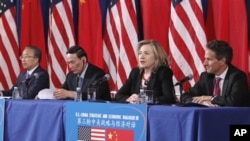"We had a very comprehensive discussion about a full range of economic issues," said U.S. Secretary of Treasury Timothy Geithner at the conclusion of the Strategic and Economic Dialogue with senior Chinese officials in Washington DC recently. "And we have made . . . significant progress in our economic relationship over the past two years."
Secretary Geithner outlined three key areas of focus in discussions with China. The first was to encourage the ongoing transformation of the Chinese economy away from its export-dependent model to a more balanced growth led by domestic demand. "We hope that China moves to allow the exchange rate to appreciate more rapidly . . . against the currencies of all its trading partners," Secretary Geithner said. "[T]his adjustment . . . is critical not just to China’s ongoing efforts to contain inflationary pressures . . . but also to encourage this broad shift to a growth strategy led by domestic demand."
The second focus was to encourage China to level the competitive playing field between American and Chinese companies. "We’ve seen . . . important steps towards that goal," Secretary Geithner said. "China [has] committed to making long-term improvements in its high-level protection of intellectual property rights and enforcement regime to strengthen the inspection of government software and use at all levels of government. This will help protect U.S. innovators as well as Chinese innovators . . . China [has] confirmed that it will no longer employ government procurement preferences for indigenous innovation products. . . This is important to make sure . . . that U.S. technology [and] U.S. firms can compete fairly for business opportunities in China.
China has [also] committed to increased transparency, requiring government authorities to publish regulations at least 30 days in advance, [so] that . . . all foreign firms have the chance to . . . see those regulations . . . just as their Chinese counterparts do."
The final focus of discussions was to engage in China’s ongoing financial reforms to create a more open, flexible, and dynamic financial system.
"Based on the strength of our conversations and the strength of this emerging relationship," Secretary Geithner concluded, "this economic relationship with China . . . will continue to grow, continue to deepen, and continue to provide tremendous opportunities for both nations."













